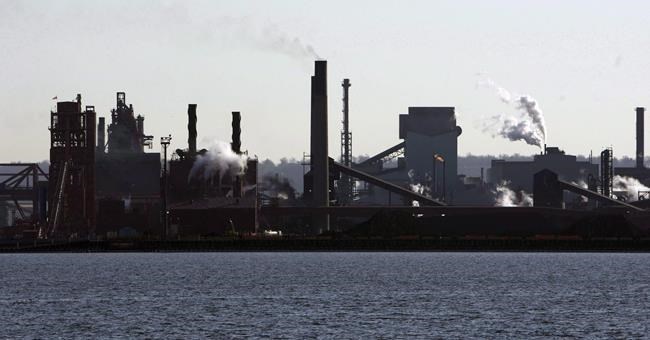
Steel mills in Hamilton, Ont., operate on March 4, 2009. Metal producers in Canada are bracing for the fallout of stiff new tariffs proposed for U.S. steel and aluminum imports, regardless of whether Canadian companies are exempted from the trade duties. THE CANADIAN PRESS/Frank Gunn
Republished March 02, 2018 - 12:54 PM
Original Publication Date March 02, 2018 - 9:36 AM
OTTAWA - Canada's metal producers are urging the government to push back against an American plan to slap steep tariffs on aluminum and steel imports, saying they are being unfairly targeted in a sweeping strategy aimed at protecting U.S. companies from state-sponsored Chinese producers.
President Donald Trump announced Thursday he intends to impose duties of 25 per cent on steel and 10 per cent on aluminum, with no mention of excluding Canada, which is the main supplier of both metals to the U.S.
The tariffs will be felt most heavily by workers and consumers in the United States as the "collateral damage" spreads throughout the American economy in the form of higher prices and stunted growth, said Jean Simard, head of the Aluminium Association of Canada.
"We're not part of the problem," Simard said. "The problem is China and the U.S. knows it."
Canada exports to the U.S. 90 per cent of the 3.2-million tonnes of aluminum it produces annually, which represents two thirds of America's total aluminum imports.
The proposed import duties would boost primary aluminum smelting jobs by an estimated 1,900, while at the same time destroying 23,000 to 90,000 jobs downstream, according to a report released Friday by Harbor, an aluminum industry consulting firm.
The tariffs will have repercussions north of the border regardless of whether the U.S. grants Canada an exemption, said Joseph Galimberti, president of the Canadian Steel Producers Association.
Diverted steel previously destined for the U.S. could swamp Canada's domestic market and will also drive down prices in other countries, making it more difficult for Canadian producers to sell elsewhere, Galimberti said.
"There is a significant volume of steel that will be displaced into the global market, which is already widely understood to be over capacity."
Numbers released by the steel producers association indicate the steel trade between Canada and the U.S. is balanced, with $6 billion of the product that moved in both directions across the border in 2017. Canada receives half of all American steel exports, while the U.S. receives 90 per cent of Canadian steel exports, the association said.
The epicentre of Canada's steel industry is Hamilton, Ont., and the surrounding region, where at least half of the country's steel exports originate, said chamber of commerce president Keanin Loomis.
"Steel to us is everything. It's our identity. It's our legacy," Loomis said, adding he and other chamber members were "gobsmacked" by Trump's announcement.
The president is expected to get around free-trade obligations between the two countries using a U.S. law that allows him to introduce the tariffs for reasons of national security.
Loomis pointed to the last time the U.S. imposed tariffs on Canadian steel imports, which occurred under former president George W. Bush. They were quickly reversed after the negative downstream effects on the American economy became apparent, he said.
"This has been tried before. It failed. It would be foolish to try ... this again."
Prime Minister Justin Trudeau called the trade measures "absolutely unacceptable."
"It just makes no sense to highlight that Canadian steel or aluminium could be a security threat to the United States," he said.
While there is scant detail on what the tariffs would look like, the North American automobile industry stands to be seriously affected.
"The auto sector really doesn't have a border," said Flavio Volpe, head of the Auto Parts Manufacturers' Association. "It's like a plate of spaghetti. It's not always that easy to pull one strand out."
It takes time to ramp up steel production, meaning that in the short term American consumers bear the costs of paying the tariffs, Volpe said. He added that boosting steel capacity is also capital intensive, the cost of which would also fall on American consumers.
Mark Nantais, president of the Canadian Vehicle Manufacturers' Association, said he didn't want to speculate about the tariffs in the absence of more details, but he encouraged Canadian officials to push for exemptions.
— Follow @gwomand on Twitter
News from © The Canadian Press, 2018